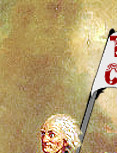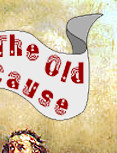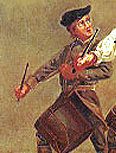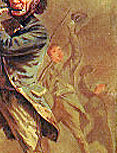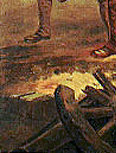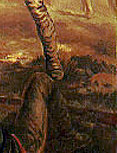|
Slavery
had been abolished in Jamaica some thirty years earlier,
but not everyone was happy with the resulting society.
The 13,000 whites – out of a population of 440,000
– lived in constant fear of a revolt like that
in Haiti (1791-1804). Many blacks, understandably tired
of gang-work on plantations, even as free men receiving
low wages, "squatted" on land in the hills,
where they raised crops to support themselves. Rather
than seeing this as a creative instance of Lockean homesteading,
the British authorities lectured these would-be peasant
farmers on their proper role in the market economy,
which was to work for their former masters. When that
didn't work, soldiers burned the squatters' villages
from time to time, to encourage them to enter the real
market – as defined by the authorities and the
planters.
Out
of the 440,000 people in Jamaica, 1,903 had the right
to vote under the strict property qualifications of
the day. Unlike mainland North America, the small number
of whites had allowed the emergence of a colored or
mulatto bourgeoisie – people of mixed race, some
of whom were lawyers, officials, merchants, and even
planters. These property-owners could vote and were
the backbone of the Town party, as opposed to the white
planters' Country party. A prominent Town party member
of the Jamaican assembly was George William Gordon,
a radical Baptist, who set himself up as the defender
of the 50,000 or so squatter-farmers in the hills and
became a violent and reckless critic of Governor Eyre
– to his own cost.
So
what is one to do in such a situation? Give one-man
one-vote instantly to everyone? Probably not. On the
other hand, greater attention by the authorities to
their own rhetoric about free markets might have helped,
even if it involved giving squatters title to Crown
lands. After all, the Queen wasn't using any of this
land. But enough about ideal social reforms.
What
actually happened was different. Governor Eyre was already
infuriated and alarmed by Gordon's attacks on him and
his administration. A minor incident on October 7, at
Morant Bay, led to reports that the blacks "had
risen," and Eyre dispatched troops. The "rebels"
miraculously disappeared in advance of the troops, a
circumstance as economically explained by the hypothesis
that no real rebellion existed as by the notion that
the "rebels" were markedly fleet of foot.
The authorities soon found a solution to this problem.
As historian Bernard Semmel puts it: "Rebels –
a 'rebel' was any Negro who had not fled before the
troops came – were hanged or flogged. No organized
opposition of any kind was encountered, however."1
I'VE
GOT A LITTLE LIST
In
the end, the troops burned a thousand homes, killed
400 some blacks, and flogged many others. If there was
any terrorism here, it was, perhaps, entirely the work
of the alarmed colonial authorities. Worse luck, Governor
Eyre had Gordon, his foe and critic, removed to a district
where martial law had been declared, where Gordon was
duly court-martialed and executed.
THE
JAMAICA COMMITTEE
These
things happen, I suppose, and wouldn't want to advise
folks who already have an empire on how to run it. Nor
do I wish to give the impression that I imagine that
these things are only done by white colonialists. No,
what is interesting, it seems to me, is the political
fallout in Britain itself and the argument over the
nature of empire and English law, which followed. Critics
of the Governor's actions established the Jamaica Committee
and called for Eyre to be tried for his excesses in
suppressing the "insurrection." More radical
members of the Committee wanted him tried for the murder
of British subjects under color of law. The Committee
was a stellar assembly of English classical liberals,
including John Bright, John Stuart Mill, Charles Darwin,
T. H. Huxley, and Herbert Spencer, among others. An
opposing committee, which included such Tories and Tory
socialists as Thomas Carlyle, Rev. Charles Kingsley,
and John Ruskin, sprang up in Eyre's defense.
Several
attempts at convicting Eyre failed and he lived peacefully
enough after a few years of legal trouble. The debate
itself is very interesting, however. Huxley observed
"that English law does not permit good persons,
as such, to strangle bad persons, as such." Thus,
whatever objections might be made to Gordon's character
and conduct, his execution by Eyre was a crime under
the law. Frederic Harrison, another Jamaica Committee
member, wrote that "English law is of that kind,
that, if you play fast and loose with it, vanishes....
What is done in a colony today, may be done in Ireland
tomorrow, and in England hereafter...."2
Eyre's
defenders claimed that the Governor deserved nothing
but praise for handling a bad situation with manly firmness
and resolution. They returned again and again to the
savagery and barbarity of Britain's colonial subjects.
They laughed off the suggestion that arbitrary rule
abroad could have any affect on rule at home, although
arbitrary rule at home was apparently not a problem
to them, either.
The
high point came for the anti-Eyre forces in April 1867,
when Lord Chief Justice Sir Alexander Cockburn issued
a lengthy "charge" to grand jurors looking
into the acts of two of Eyre's subordinates. He stated
that in a "settled" colony such as Jamaica,
English law applied in full and that the concept of
"martial law" was completely foreign to it.
The jurors, much of the press, and most of the public
thought otherwise.
MILITARIZATION
OF AMERICAN POLICE WORK: AN IMPERIAL BACKWASH?
Time
and again, critics of empire have warned that arbitrary
and authoritarian methods of rule employed in the colonies
will come back to haunt the inhabitants of the home
country. This seems to be true. Many people who can
remember the 1950s will have noticed a certain trend
in U.S. police work, which first became noticeable in
the 1960s. Instead of John Wayne and a few conventionally
armed deputies conducting the arrest of an accused criminal,
or one caught in the act, as civilian upholders of law
and order, we see oddly uniformed characters proceeding
with absurdly overwhelming force, tanks, helicopters,
etc., making up "rules of engagement" as they
go. In short, we see domestic police aspiring to be
an army engaged in colonial pacification or the
utter elimination of a public enemy.
Now
this trend toward the militarization of American police
work probably grew out of a number of circumstances,
including the "civil unrest" – to use
a delicate phrase – of the 1960s and early '70s.
It also runs neatly parallel to the willful destruction
of genuine local self-government, such that the word
"federal" now refers to its opposite: consolidated,
centralized, national. But it was the expansion of the
American Empire under cover of the Cold War that made
the elimination of real federalism feasible. With this
came the "need" to root out dissent from the
Cold War, or the "hot" wars to which it sometimes
led, and hence the "need" for post-constitutional
national police and intelligence agencies to oversee
the American sheep. The precise role of the Vietnam
War in encouraging the militarization of American police
deserves some serious research, if that isn't already
under way. At the moment, I can't "prove"
the relationship suggested here. Perhaps, the Cold War
only created an "atmosphere" – a "climate
of hate" perhaps? – which helped the process
along.
EMPIRE
AND BUREAUCRACY
So
what has this got to do with old Governor Eyre? Just
this: imperial overlords must govern arbitrarily their
colonies and protectorates. There is a constant flow
of personnel and ideas between the bureaucracies in
the colonial boondocks and those in the metropolitan
center. That benign institution, the Pennsylvania State
Police, apparently was modeled on the Philippine Police
set up in "our India," and the Philippine
Police in turn owed something to the example of the
Royal Irish Constabulary.3
Norman Schwarzkopf, Sr., headed the New Jersey State
Police, but in another incarnation helped bring down
that weepy fellow Mossadegh in Iran so that the Shah
could do whatever he did for several decades. And, later,
his son restored "democracy" to Kuwait, which
had never had it – and by some reports still doesn't.
Ultimately,
the flow of ideas from the imperial to the domestic
bureaucracies is the most worrying. A few tanks and
bazookas in the hands of Andy of Mayberry wouldn't be
all that threatening. Not unless Andy and his kind take
on the military mindset in which "Go down there
and arrest that fellow" is replaced by "The
target is acquired." If your local police chief
ever worked for the School of the Americas – bringing
bad government to Central America more efficiently –
you should fret a little.
MARTIAL
LAW AND MARTIAL MUSIC
Reporting
on the Jamaican "uprising" of 1865, a Captain
Ford wrote: "This is a picture of martial law.
The soldiers enjoy it, the inhabitants here dread it.
If they run on their approach, they are shot for running
away."4 Just so.
Martial law, in other words, is no law at all, but a
sort of domestic declaration of war. We had some experience
with Captain Ford's predecessors in the 1770s and 1780s.
One result was a Constitutional and political culture
which was quite a bit more serious about separating
civil rule and military power than it was (allegedly)
about separating religion from public life. The Posse
Comitatus Act was supposed to nail this down. That the
Mutant Ninja SWAT Team and Imperial Lancer mentality
has eroded these principles and the law in recent decades
can be seen in an excellent Cato Institute report by
Diane Cecilia Weber.5 So don't just
take my word for it.
THESE
BOOTS ARE MADE FOR WALKING
The
evidence of militarization is all around us, although
I shall not be so callous as to use that terrible phrase
about "jackbooted thugs." Presidents spread
semantic confusion by pretending that full-scale wars
are "police actions." The "war"
on drugs bids fair to leave us with no Bill of Rights
at all and no security for anyone's property except
for paid-up contributors to the Republican and Democratic
parties – those "rival gangs of political
speculators," as Frederick Engels called them.
I won't even mention the cases of Waco and Randy Weaver6
except to say that I'm not mentioning them – yet.
There are strong reasons to believe that arbitrary government
at home is pushed along by empire abroad. That is a
high price to pay for being that last remaining superpower,
for the right to export "democracy" (whatever
that might be) by violent and criminal means to those
who don't want it or understand it, or for the Open
Door. Like the essayist Robert Benchley, I'd settle
for the Half-Ajar Door Policy and more freedom at home.
[1] Bernard Semmel, Democracy versus Empire: The
Jamaica Riots of 1865 and the Governor Eyre Controversy
(Garden City, N.Y., 1969), p. 51.
[2] Ibid., p. 128 and p. 137.
[3] Mike Brogden, "An Act to Colonise the Internal
Lands of the Island," International
Journal of the Sociology of Law, 15 (1987),
p. 185.
[4] Semmel, p. 15.
[5] Diane Cecilia Weber, "Warrior
Cops: The Ominous Growth of Paramilitarism in American
Police Departments," Cato Institute Briefing
Papers, 50 (August 26, 1999).
[6] But see the excellent book by antiwar.com contributor
Alan Bock, Ambush
at Ruby Ridge (Irvine, Ca., 1995).
Please
Support Antiwar.com
A
contribution of $20 or more gets you a copy of Justin
Raimondo's Into the Bosnian Quagmire: The Case Against
U.S. Intervention in the Balkans, a 60-page booklet
packed with the kind of intellectual ammunition you
need to fight the lies being put out by this administration
and its allies in Congress. Send contributions to
Antiwar.com
520 S. Murphy Avenue, #202
Sunnyvale, CA 94086
or
Contribute Via our Secure Server
Credit Card Donation Form

|

